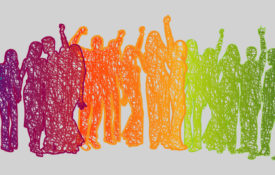Position Statement on Racism, Bias, and Intolerance:
The Association for Psychological Science (APS) stands steadfastly with individuals and communities around the world who are or have been victims of discrimination and injustice. Psychological research has chronicled the harmful effects of racism, as well as implicit or unconscious bias, on individuals and society. Importantly, psychological science also offers insights to help individuals and organizations combat racism and build more equitable and inclusive organizations and communities.
APS Equal Employment Opportunity Statement
APS provides equal opportunity to all employees and applicants for employment. No person shall be discriminated against because of race, color, religion, sex, national or ethnic origin, age, physical handicaps, genetic information, marital status, sexual orientation, family responsibilities, citizenship, political affiliation, or any other category that is protected by applicable federal, state, or local law.
Research Collections
APS engages the public with psychological research through its scientific journals, its member magazine the Observer, outreach to media outlets, and presentations at conferences and other events. These collections of articles provide a snapshot of psychological research on diversity, equity, and inclusion and the causes and harmful effects of racism, stereotypes, and inequities.
-

Cultural Diversity
How do people respond to increasing cultural diversity in their communities, cities, and countries? Researchers investigate.
-

Implicit Bias
Unconscious bias can lurk below the level of conscious awareness, but researchers are working to uncover more effective methods of reducing these prejudices.
-

LGBTQIA+
Psychological science has played a leading role in busting misconceptions about sexual orientation and gender identity, and in changing people’s attitudes toward individuals who are part of the LGBTQIA+ community.
-

Racism and Discrimination
Psychological researchers are examining the complexities of racism and xenophobia at both the interpersonal and societal levels.
-

Gender and Bias
Researchers explore the factors that perpetuate gender inequality and the effects that such bias can have on women in the workplace and beyond.
-

Workplace Diversity
When done well, efforts to improve intergroup harmony at work can uplift individuals and lead entire organizations to perform at a higher level.
Awards and Honors
APS’s Awards Program recognizes psychological scientists for outstanding contributions at all career stages. Nominators and awards committees are asked to consider the diverse and international nature of our field. APS seeks nominations of members of underrepresented groups in psychological science
The new APS James S. Jackson Lifetime Achievement Award for Transformative Scholarship honors APS Members for their lifetime of outstanding psychological research that advances understanding of historically disadvantaged racial and ethnic groups and/or understanding of the psychological and societal benefits of racial/ethnic diversity, equity, and inclusion. The type of scholarship honored by the award is broad in scope and research methodology, and encompasses research on historically disadvantaged racial/ethnic groups residing anywhere in the world. Recipients must be APS members, and their contributions may be in any field or area of psychological science. The inaugural winners, Patricia Gurin and James M. Jones, were honored at the 2022 APS Annual Convention.
APS Fellow nominations no longer require that a current APS Fellow contribute one of the nomination letters, and criteria for Fellow status have been amended to include consideration of “an outstanding record of mentoring students from diverse backgrounds, working with research participants from diverse backgrounds, and making outstanding contributions to diversity and inclusion within the field of psychological science.”
Grants
The APS Fund for Teaching and Public Understanding of Psychological Science supports the teaching and public understanding of psychological science in the U.S. and around the world. A special category within the grants program supports projects that aim to eliminate racial bias in psychological science curricula and incorporate principles of racial justice into psychological science curricula.
The William K. and Katherine W. Estes Fund supports advanced training opportunities in mathematical and computational modeling for psychological science in summer schools and focused workshops. Funding criteria include an express commitment to “the inclusion of scientists of all genders, races, sexual orientations, disability statuses, countries of origin, geographical locations, and disciplinary expertise.”
The RISE (Researching Injustice and Social Equality) Award, open to APS Student Affiliates, seeks to cultivate psychological science research in fields related to socially and economically underrepresented populations, and recognizes outstanding student researchers from diverse racial, ethnic, geographic and cultural backgrounds, as well as other underrepresented groups in psychological science.
APS Student Caucus Programs
APS is pleased to offer special programming for students at the APS Annual Convention. Hosted by the APS Student Caucus, APSSC panels and events are designed to be fun and informative, featuring voices from various backgrounds, industries, and disciplines. The APSSC Executive Board develops this programming each year, keeping the content up to date and relevant for students.
During the 2024 APS Annual Convention, the APSSC hosted an event titled “Engaging in and Navigating Social Justice Advocacy in Academia.” The panel focused on social justice advocacy in and outside of academia. Topics included the following: 1. What advocacy work looks like and how it is shifting in the field of psychology, 2. How students can navigate this type of work in a culturally-appropriate way (i.e., self-reflection, acknowledging privilege and bias), 3. Where students can find joy among this work (i.e., self-care and boundary-setting), and 4. Ways to actively engage in social justice advocacy as a student.
Also at the 2024 Annual Convention was a “DEI Roundtable for Young Psychological Scientists,” where students had the opportunity to informally interact with a diverse group of leaders in psychological science to discuss questions and experiences related to marginalized identities in psychological science.
Public Policy
In ongoing outreach to legislators and federal agencies about the contributions behavioral science can play in addressing societal ills, APS promotes the use of empirically validated findings in the treatment and prevention of mental illness and in improving public health, education, economic productivity, social justice, and more. Recent and upcoming APS activities include:

- In addressing the COVID-19 crisis, referencing the crisis of racism and the role psychological science can play in better understanding and combatting those issues.
- Providing feedback to science agencies and other government entities about the role that psychological science can play in combatting structural racism, such as APS’s April 2021 comments in response to NIH’s UNITE initiative.
- Hosting the National Research Mentoring Network, which seeks to help historically underrepresented mentees successfully progress in their behavioral and biomedical research careers, for a January 2021 webinar for APS members.
- Collaborating with scientific coalitions in joint action, such as a September 2020 message asking the National Academy of Sciences to undertake a study to acknowledge and assess the full participation of racial and ethnic groups underrepresented in science, tech, education, and math.
- Advocated for increased funding for the National Science Foundation Graduate Research Fellowship Program, which helps student scientists, including those from backgrounds underrepresented in science, pursue scientific careers. NSF now awards more, bigger fellowships.
Journals
APS’s six journals publish cutting-edge research across all areas of the field and promote the integration of scientific perspectives within psychological science and with related disciplines. Committed to broadening the diversity of their reviewer, author, and editorial pools, the editors seek original research that aids in public understanding of the causes and harmful effects of racism, stereotypes, and inequities; the psychological and societal benefits of diversity, equity, and inclusion; and the most effective ways to foster these outcomes and advance a more just and equitable world. Recent APS journal activities include:

- Publishing a special issue of Perspectives on Psychological Science on the topic of racial microaggressions, guest edited by Monnica T. Williams, Associate Professor and Canada Research Chair in Mental Health Disparities at the University of Ottawa. Dr. Williams was also interviewed about the issue on the APS podcast, Under the Cortex.
- Undertaking the collection of anonymous demographic data from authors of submitted and accepted manuscripts. Having an accurate understanding of the pool of APS authors will allow us to track our progress as we aim to expand that pool and ensure that the authors represented in our journals reflect the diversity of our field.
- Hosting a webinar with APS journal editors and staff aimed at students and early career researchers explaining the peer review process and what makes for a quality review with an eye toward creating a larger and more diverse pool of reviewers evaluating manuscripts submitted to APS journals.
- Curating collections of APS journal articles related to issues such as racism, and making the articles contained in these collections freely accessible to the public.
- Publishing a special issue of Clinical Psychological Science, “Understanding Ethnoracial Disparities and Advancing Mental Health Equity through Clinical Psychological Science,” guest edited by P. Priscilla Lui, Department of Psychology, University of Washington and Craig Rodriguez-Seijas, Department of Psychology, University of Michigan. The special issue showcases innovative clinical psychological research that characterizes psychopathology among people of color, elucidates determinants of ethnoracial mental health disparities, and informs culturally responsive prevention and treatment.
Convention Programs
APS conventions present a wide array of diverse voices from across the psychological science community.
Each year, members of the APS Annual Convention Program Committee and the Diversity, Equity, and Inclusion Committee plan a special invited event to highlight research related to diversity. This program can be an address by a prominent speaker or a panel of speakers on psychological science research related to ethnicity, culture, race, sexual orientation, disability, or other dimensions of diversity.
In the 2024 program, ““Churn”: Life in a Diverse Society and How to Make it Work” Claude Steele discussed the worrisome vigilance that many people in underrepresented groups adopt to disprove stereotypes. “It puts them in a state that I call ‘churn,’—vigilance about how their identify is going to play out in a situation,” he said. Steele summarized experiments that have shown some ways to overcome tensions in diverse environments.
The 2023 program, “Upending Racism in Our Science: Where the Rubber Meets the Road” discussed how psychological science lacks diversity in topics, populations researched, scientists, reviewers of our science, and dissemination avenues and how this narrow lens stifles intellectual contributions, idea generation and scholarly innovation. This talk also highlighted structural and procedural barriers holding psychological science back and offered concrete strategies to deviate from that norm.
The 2022 program, “Bias in Graduate Admissions: Solutions and Future Directions,” assembled three thought leaders in the area of diversity, equity, and inclusion in higher education to explore where bias comes in during the admissions process, how biases can be reduced, and where more empirical research is needed. In addition to the live events, APS shares content broadly on social media to engage a broader audience.
Special Events
The 2024 APS Annual Convention featured a session planned by the Disability and Advocacy Research Network (DARN) titled “Including Disability and Disabled Researchers in Psychological Science,” which discussed barriers and facilitators to inclusion in the field. Additionally, the Ewing Marion Kauffman Foundation planned a session on the unique challenges and opportunities for entrepreneurs from underrepresented groups, titled “Towards an Inclusive Landscape of Entrepreneurship: Supporting Underrepresented Founders.”
APS-David Myers Distinguished Lecture on the Science and Craft of Teaching Psychological Science
The 2023 David Myers Distinguished Lecture, “Towards a More Equitable Classroom: Contending With Bias and Oppression in Teaching and Learning,” featured Corinne A. Moss-Racusin of Skidmore College. Moss-Racusin discussed higher education and how it strives to provide meritocratic opportunities for people of all backgrounds to pursue their academic and intellectual goals. However, research suggests that biases can undermine the fair treatment and evaluation of both teachers and instructors. Moss-Racusin drew upon evidence-based strategies and extensive personal experience to discuss how academic communities can cultivate socially-just learning environments.
Notable examples of DEI-focused content include:
- Derek Avery on Injecting Facts, Not Feelings, Into DEI Debates (2024)
- Global Science Requires Greater Equity, Diversity, and Cultural Precision (2023)
- Representation and Relevance: Diverse Scholars Share Ideas for a More Equitable Field (2023)
- Diversity, Trust, and Informed Consent: Making Genetics Research Effective for All (2023)
- Complexities and Lessons in Researching Culture-Specific Experiences (2023)
- Latin American Psychological Science: Will the Global North Make Room? (2023)
- Reducing Biases in the Graduate School Admissions Process (2022)
- Reducing Race and Other Disparities in and Through Psychological Research (2021)
- Understanding and Capturing the Value of Diversity: A Special Look at Gender (2019)
- STEMing the Tide: How Female Experts and Peers Act as “Social Vaccines” to Protect Young Women’s Self-Concept in STEM (2018)
- Real-World Implications of Implicit Bias (2018)
- Bring the Family Address: “The Paradox of Diversity: Promise, Pitfalls, and Implications for Racial Progress” (2018)
- Diverse Perspectives in Psychological Science (2016)
- Inside the Psychologist’s Studio with Jennifer Richeson, Yale University (2016)
- Why Should Psychological Science Care About Diversity? (2015)
- Inside the Psychologist’s Studio with Margaret Beale Spencer, The University of Chicago (2012)




